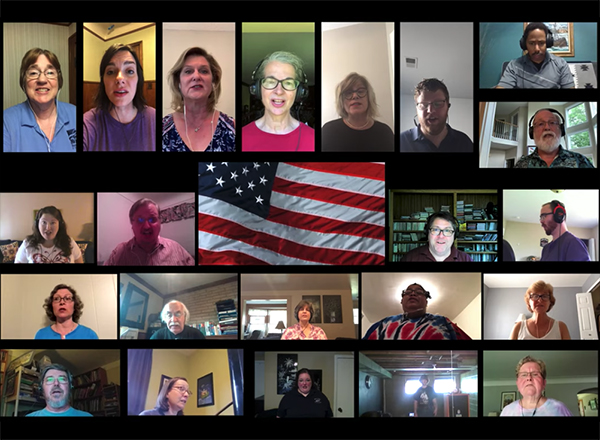Instructional Innovations: how to teach and learn music fully online

HFC’s entire music department, including all classes in Chorus, Vocal Jazz Ensemble, and Jazz Band, will be taught online for the entire 2020-21 academic year, which begins Thursday, Aug. 27.
“I don't know if any other music programs can make this claim, especially as pertains to bands and choruses,” said HFC music professor G. Kevin Dewey, who is head of the music department.
All the coursework for the Associate of Arts in Music degree and the Certificate of Achievement in Recording Arts programs will be online, according to Dewey. Music will be taught virtually because of the COVID-19 pandemic.
“We want all students to be able to pursue their music education safely, without fear of being infected,” explained Dewey. “It’s a safety precaution. This novel method of delivery may only last for this year. Once it’s safe to meet face-to-face again, we’ll probably move back to that, but keep some online aspects for many of the courses.”
Music can be taught effectively in an online environment
While teaching in-person is preferable, it is possible to teach music effectively online, says Dewey, who has proof. In the Winter 2020 semester, Dewey and his music students recorded their first two “HFC Virtual Chorus” projects in the early days of the pandemic. They released on YouTube the College’s official song, “Pro Bono Omnium" (which Dewey composed) and “The Star-Spangled Banner”
“These projects are the ‘performance’ portion of what HFC Chorus, Blue Fusion Vocal Jazz Ensemble, and Studio 110 Jazz Band will be doing under my direction this academic year,” said Dewey. “The rehearsals and sectionals will use a combination of the traditional technique of practice recordings, remote videoconferencing, and virtual performance feedback. I'm rehearsing and fine-tuning the special techniques needed for virtual chorus performances this summer with Vanguard Voices, the HFC choir-in-residence.”
Other colleges and universities are trying to figure out ways to safely rehearse in person. Dewey doesn’t feel that’s the best way to go during the pandemic. More importantly, he doesn’t feel it is worth the health risk to the students. He has announced that all music ensembles he conducts will rehearse remotely and will give virtual performances for the 2020-21 academic year.
“There will be no live concerts in the coming year,” said Dewey. “There will be ‘virtual concerts,’ which will likely appear as YouTube public releases. My plan is to have our largest project be a ‘President's Virtual Collage Concert,’ which will drop sometime toward the end of the Winter 2021 semester.”
Advantages to teaching and learning music online
There are some advantages to teaching and learning music online.
“It will actually be easier to hear the individual student musicians, as they will be required to send me recordings of themselves singing and playing their parts, while listening to guide-tracks on headphones,” said Dewey. “The recordings I receive from them will have nothing audible but their individual voice or instrument. This will be helpful to both the performer and director.”
Dewey has learned to use various videoconferencing apps – Big Blue Button, Microsoft Teams, Zoom – to give lectures and receive live feedback from his students. He’s also learned to use Moodle, HFC's Learning Management System. This will help keep attendance, assignments, grades, handouts, and other materials well organized and accessible to students. These will help with both the traditional classes and the performing ensembles. The Recording Arts staff has provided invaluable assistance in developing the online techniques, said Dewey.
“I like to pull out all I can from my students in music classes,” he said. “In music, it's a bit of a hindrance to be shy, so I help the less gregarious students discover their personalities and allow them to amplify those features. This will be harder with the loss of face-to-face interaction. However, I hope that online discussion boards, plus the back-and-forth that is possible during remote videoconferencing rehearsals, will allow this to happen.”
A viable alternative
Dewey couldn’t say whether teaching music online will become the new norm. However, for the 2020-2021 academic year, all the Music and Recording Arts staff are on board with this model, and are sharpening their skills to be able to deliver it effectively.
“After one full academic year of this mode of instruction and learning, I'll reevaluate,” he said. “First, whether it will be safe to return to campus, meaning there is a coronavirus vaccine and treatment. Then, we'll probably return to hybrid classes, which will combine the best elements of face-to-face and online modes.”
The only exception to the 100% online commitment is that Recording Arts students will need to come to campus six times during the fall semester and 6-9 times during the winter semester. However, the Recording Arts staff are willing to work with students who are unable to do that.
“I think this will be perfect for musicians who don't want to interrupt their music education and want to continue with as strong a guarantee of safety as possible,” said Dewey. “I encourage those who are nervous about the online mode to give it a try. Some of us teachers are new to it, too. We can work together to have it be a meaningful, enriching, enjoyable experience.”